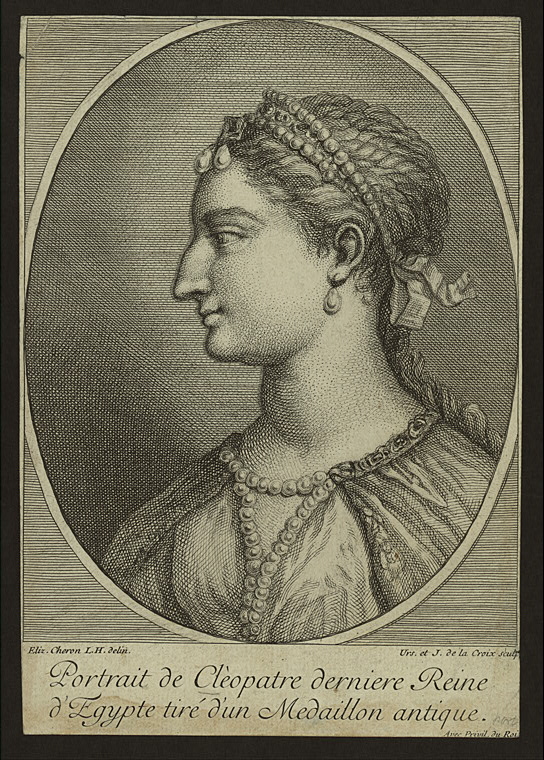When people hear the name Cleopatra, they often associate this name with a woman whose charms and seduction powers led her to bedazzle two of the most powerful men in Roman history, Julius Caesar, and Mark Antony. But what were her intentions in her entanglements with these two important historical figures? Roman history portrays her as a woman “foolish enough to think that she might one day rule Rome, and devious enough to lure a decent man (Caesar) away from his heart and home.” 1 This depiction, however, does not entirely describe the woman who could control and keep one of the most significant empires in history. Cleopatra’s relationships with Julius Caesar and Mark Antony provided her with resources to reestablish a strong Egyptian empire, which, despite her efforts, would later come to an end with her death. Cleopatra’s portrayal in history has been limited to her relationship with these two Roman generals, and Roman historians have generally given her a bad reputation.2 There has been little emphasis on other aspects of her life, her accomplishments, and her reign as the last queen of the Egyptian empire.

Cleopatra VII was the last monarch of Egypt, and many would think that she was, therefore, Egyptian, but what many may not know is that she was actually Greek. Born in Alexandria, Egypt, Cleopatra was a direct descendant of the Macedonian Ptolemaic dynasty.3 The Ptolemies had ruled Egypt since the death of Alexander the Great in the early fourth century B.C.E. Cleopatra was not only the last monarch of Egypt but also the last Ptolemaic ruler.4 She was also the only Ptolemaic ruler who learned the Egyptian language.5
When Ptolemy XII Auletes (Cleopatra’s father) died in 51 B.C.E., the throne of Egypt was taken by the seventeen-year-old Cleopatra and her brother, the ten-year-old Ptolemy. The two of them then ruled as Cleopatra VII and Ptolemy XIII.6 Brother and sister ruling together did not mean problems would be limited. In fact, a few years after Cleopatra and Ptolemy took the throne of Egypt, Ptolemy started a new dating system, and he also claimed sole rule of Egypt from his father’s death. In the summer of 49 B.C.E., Cleopatra’s name disappeared from all Egyptian official documents, and Ptolemy XIII proclaimed himself as the sole ruler of Egypt, forcing Cleopatra to leave Alexandria.7 This event was what led her to meet Julius Caesar. As a Roman officer, Caesar had the power of intervening in the problems between Cleopatra and her brother. His attempts would have been successful if not for the intervention of Ptolemy’s allies who opposed allowing Cleopatra to rule again. After the known Alexandrian War, Cleopatra was restored by Caesar to the throne of Egypt after the death of her brother Ptolemy XIII in the war.8 These events started Cleopatra’s relationship with Caesar, a romance from which Caesarion, the first son of Cleopatra, was the fruit. Cleopatra’s relationship with Caesar not only gave her back control over Egypt, but it also meant protection from Rome; and for Caesar, it meant an access to Egypt’s wealth.9

Besides the power she gained from her relationship with Caesar, Cleopatra’s marriage with Mark Antony, after Caesar’s death, led her to accomplish the restoring of the Egyptian empire. Mark Antony believed that the greatness of the Roman empire “consisted more in giving than taking.”10 Based on this belief, Antony gave his new wife, Cleopatra, extensions of land stretching from the Mediterranean coast, “from Cilicia, through Syria and Phoenicia, large past of Judaea, Lebanon and the Arab state of Ituraea.”11 Cleopatra’s intentions in restoring Egypt were also manifested by the names she chose for her children. Her first son, Caesarion, was named after Julius Caesar, claiming that her son was indeed the son of this important Roman figure.12 She also had three more children with Mark Antony. Their names also reflected Cleopatra’s ambitions. The twins, Alexander Helios and Cleopatra Selene, were named in honor of her family lineage. Alexander Helios was named after Alexander the Great as the sun god Helios. This character represented the role model of Ptolemy III, who extended the power of the Ptolemaic rulers to its greatest extent. In the same way, the name of Cleopatra Selene was inspired from the goddess Isis, a figure that had represented and ruled most of the region within the Ptolemaic and Seleucid lineage. For this reason, Cleopatra Selene was the most convenient name to manifest Cleopatra’s attempts to unify Egypt and Syria under her control.13 Her last child was named Ptolemy Philadelphus, named after the man who had ruled the territories she obtained when she married with Mark Antony.14

Cleopatra’s relationship with Mark Antony, although it gave her power and control over a large number of territories, also brought the end of her reign and, consequently, the end of the Egyptian empire. When Antony established that Caesarion and his three children with Cleopatra would rule Egypt and the Roman provinces in Asia minor, Octavian, adoptive child of Caesar and Antony’s first wife’s half-brother, declared war on both Antony and Cleopatra. The known Battle of Actium in 31 B.C.E. went badly for Antony, and it started the fall of Egypt and her queen. When Cleopatra realized her defeat was inevitable, she committed suicide in 30 B.C.E., marking the end of the Ptolemaic rule and the fall of Egypt to Roman control.15

Undoubtedly, Cleopatra was very intelligent in relating with both Julius Caesar and Mark Antony, and by consequence obtaining great power and control. She may have recognized that the aid of two of the most important Roman generals could eventually lead her to achieve her ambitions of extending the Egyptian empire.16 However, she never accomplished her intentions. Her ambitions were strongly highlighted by her relationship with the two Roman generals, and these two men provide her with the resources she needed to obtain the establishment of a stronger Egypt. Her determination in achieving what she aimed for is admirable.
Although Roman history has portrayed her as a bad woman dangerous for Rome, as followed by the propaganda of Octavian,17 Cleopatra not only related herself with two of the most important men in Roman history, but she also created a pathway towards the unification of a kingdom. She might have been successful if not for the events that led to the fall of her reign.
- Joyce A. Tyldesley, Cleopatra: Last Queen of Egypt (New York: Basic Books, 2008), 206. ↵
- Salem Press Biographical Encyclopedia, January 2015, s.v. “Cleopatra VII,” by Frances Stickney Newman. ↵
- J. Fletcher, Cleopatra the Great: The Woman behind the Legend (New York: HarperCollins, 2011), I. ↵
- Salem Press Biographical Encyclopedia, January 2015, s.v. “Cleopatra VII,” by Frances Stickney Newman. ↵
- Salem Press Encyclopedia, January 2015, s.v. “Ptolemaic Dynasty,” by Milton Berman. ↵
- Salem Press Biographical Encyclopedia, January 2015, s.v. “Cleopatra VII,” by Frances Stickney Newman. ↵
- Tyldesley, Cleopatra: Last Queen of Egypt, 48. ↵
- Salem Press Biographical Encyclopedia, January 2015, s.v. “Cleopatra VII,” by Frances Stickney Newman. ↵
- Tyldesley, Cleopatra: Last Queen of Egypt, 57. ↵
- Fletcher, Cleopatra the Great: The Woman behind the Legend, 268. ↵
- Fletcher, Cleopatra the Great: The Woman behind the Legend, 268. ↵
- Salem Press Biographical Encyclopedia, January 2015, s.v. “Cleopatra VII,” by Frances Stickney Newman. ↵
- Fletcher, Cleopatra the Great: The Woman behind the Legend, 264. ↵
- Fletcher, Cleopatra the Great: The Woman behind the Legend, 270. ↵
- Salem Press Biographical Encyclopedia, January 2015, s.v. “Cleopatra VII,” by Frances Stickney Newman. ↵
- Salem Press Biographical Encyclopedia, January 2015, s.v. “Cleopatra VII,” by Frances Stickney Newman. ↵
- For a clear example of Octavian’s propaganda, see Book IV of Virgil’s Aeneid and his portrayal of the African queen of Carthage, Dido. ↵



58 comments
Sergio Cervantes
I enjoyed reading this article and learning about the ambitions of the last Egyptian monarch. It is interesting to read about the two relationships she had in order to build up her empire and restore its place as a strong civilization. I find it fascinating to read how her plans for restoration were foiled by Octavian at the Battle of Actium. She was so close to reaching her goals but fell short. I also never knew that she was of Greek origin and had committed suicide upon hearing of the army’s defeat at Actium.
Hayden Hollinger
Cleopatra was a great person to read about. There was much more to her that I previously was not aware of. I liked learning more about her early life, her accomplishments, and her reign as queen. I found it especially interesting to learn that she was Greek, despite being the queen of Egypt. I liked how it was Caesar that could intervene between the problems between Cleopatra and her brother, and that it was Caesar that got her to the throne.
Aimee Trevino
Really great article! I had always heard of Cleopatra, Julius Ceasar, and Marc Antony, but I never knew they all crossed paths together. I also never knew Cleopatra was actually Greek! I really enjoyed all the information that you gave us, and felt that it was thoroughly explained. Cleopatra was clearly a very smart woman, and knew how to get to what she wanted. Overall, really interesting article.
Mariana Govea
I really enjoyed reading this article! Great research! The article was very informative, great job listing and organizing Cleopatra’s life and accomplishments! Before reading this article I had an idea of who Cleopatra was but I did not know exactly what she did or how her name became known which you did more than an awesome job pointing it out! As well as I never knew that she got associated with Julius Caesar and Mark Anthony which is super interesting how crazy because I do know the story of Julius Caesar!As well as I did not know she was Greek! Great informative article!
Nataly Solis Chavez
I had no idea Cleopatra had crossed paths with nether Julius Cesar nor Mark Antony. She even had children from both powerful Roman generals. I enjoyed reading about Cleopatra’s earlier life, where she was from and the conflicts she faced when it came to ruling alongside her brother. I especially like how you approached the topic from different perspective than usual, great job!
Alyssa Valdez
Very interesting article. I have heard about Cleopatra but I did not know much about her or her background, I was not aware of how much of an impact she had on history! I am astonished that she was only seventeen when all this occurred! Just goes to show on how dedicated women are and how they are just as powerful as man to rule.
Samuel Sanchez
This article was interesting. I did not she was almost erased from history because of her brother I thought she was in control the whole time. But wow what a comeback. With allying with two great Roman generals she knew that she was able to restore power back into Egypt. It show how intelligent she was since she took responsibility of the throne at a young age and successfully coming back to the thrown when she was booted out. Great read.
Jennifer Pogue
The pictures and stories that I read about Cleopatra as a child do not do her justice! As the beginning of your article addresses, I believed that she seduced men and was not a real ruler. Your article gave me a new perspective on her ability to rule. I am most surprised that she was queen at seventeen years old. Imaging a junior in high school running a kingdom is terrifying. Overall, great article!
Anayeli Prieto
Really great article! from what I’ve learned from ancient Egypt, women didn’t have much rights and there were not very many leaders in ancient history. Cleopatra demonstrates that women can be as just as good as men at leading Egypt. I feel I in a way that these are the first ways that a woman fight for their independence and for equality.
Ana Gonzalez
What a well-written and well-researched article! Before reading this, I only knew that Cleopatra ruled Egypt and was beautiful but now I know the way in which she obtained power and even how she named her children. What was extremely interesting was not that she had romances with two powerful men but that her goals were ambitious and she did everything she could to accomplish them. I think its amazing how Cleopatra wanted to unify Egypt and I agree that she should not be portrayed as a bad woman.